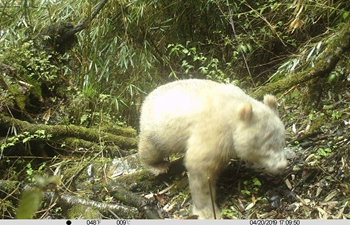NANCHANG, May 26 (Xinhua) -- Since May, Zhu Hongmei's homestay, called "egret photo studio" by locals, enters the busiest time of the years, as the graceful birds start their breeding season.
Thousands of shutterbugs from across the country flock in the small town of Xiangshan in east China's Jiangxi Province, where Zhu's homestay is located, to capture shots of the rare birds.
The number of tourists surged in recent years with increasing egret population in the Xiangshan forest park thanks to stronger nature protection, Zhu said, and so is the local homestay business.
Xiangshan, which once suffered from environmental damage, has seen forests and wetlands expanding in recent years. It is now dubbed as the "egret kingdom", a paradise where some 300,000 birds of the kind migrate to nest and breed each year.
"Only 30,000 of the bird migrated here 30 years ago, as wetlands and forests, which are their main habitats, were damaged," said Xiong Xinming, director of the forest management station.
Xiangshan now boasts 533 hectares of forest, doubled compared with 30 years ago. The bird paradise has also become home to some rare species of the egrets.
Many tourists and photographers have been attracted there. Seven local homestays like Zhu's receives an average of about 100 tourists each day from early March to late July each year.
The booming businesses help villagers in Xiangshan increase their income by over a million yuan (around 145,500 U.S. dollars) each year.
Luo Haoquan, a tourist, was among Zhu's earliest guests when she started her homestay 15 years ago.
Luo, a retiree from south China's Guangdong Province, has been to the town eight times over the years. This year, he invited over 20 fellow photographers to come with him.
"The biggest change in the park is the egret population," he said, "We used to take pictures of them from a distance, but now we can have a closer shot [as there are more birds]."
Luo added that the infrastructure of the town has also improved, with asphalt roads built to reach all the local homestays.
These photography enthusiasts are not only bird lovers but also bird guardians, Zhu said.
The local forest management station has set up patrol teams to watch the forest around the clock, and some photographers offer to join the night patrol, helping chicks that fall from the tree back to the nest.
"Each year before egrets arrive here, we also popularize knowledge about bird protection among locals," said Xiong, head of the management station.
The egrets would nest in the first month they come to the park and breed nestlings in the following month, and they would destroy their home before they leave.
Local villagers know these details of the migratory bird and know when to bring them some food and when to leave them undisturbed, Xiong said.

















